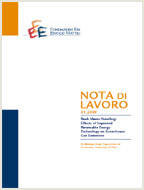Could resource rents finance universal access to infrastructure? A first exploration of needs and rents

14.11.2015
Sabine Fuss (Mercator Research Institute on Global Commons and Climate Change); Claudine Chen (Mercator Research Institute on Global Commons and Climate Change); Michael Jakob (Mercator Research Institute on Global Commons and Climate Change, Potsdam Institute for Climate Change Impact Research); Annika Marxen (Technical University Berlin, Mercator Research Institute on Global Commons and Climate Change); Narasimha D. Rao (International Institute of Systems Analysis,); Ottmar Edenhofer (Mercator Research Institute on Global Commons and Climate Change, Technical University Berlin, Potsdam Institute for Climate Change Impact Research)
H54
Resource Rents, Infrastructure, Economic Development
Climate Change and Sustainable Development
Carlo Carraro
It is often argued that, ethically, resource rents should accrue to all citizens. Yet in reality the rents from exploiting national resources are often concentrated in the hands of a few. If resource rents were to be taxed, on the other hand, substantial amounts of public money could be raised and used to cover the population’s infrastructure needs, such as access to electricity, water, sanitation, communication technology and roads, which all play important roles in a nation’s economic development process. Here, we examine to what extent existing resource rents could be used to provide universal access to these infrastructures.
***
Suggested citation: Fuss, S., C. Chen, M. Jakob, A. Marxen, N. D. Rao, O. Edenhofer (2015), ‘Could Resource Rents Finance Universal Access to Infrastructure? A First Exploration of Needs and Rents’, Nota di Lavoro 93.2015, Milan, Italy: Fondazione Eni Enrico Mattei
